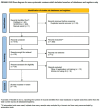Artificial Intelligence in Surgical Training for Kidney Cancer: A Systematic Review of the Literature
- PMID: 37835812
- PMCID: PMC10572445
- DOI: 10.3390/diagnostics13193070
Artificial Intelligence in Surgical Training for Kidney Cancer: A Systematic Review of the Literature
Abstract
The prevalence of renal cell carcinoma (RCC) is increasing due to advanced imaging techniques. Surgical resection is the standard treatment, involving complex radical and partial nephrectomy procedures that demand extensive training and planning. Furthermore, artificial intelligence (AI) can potentially aid the training process in the field of kidney cancer. This review explores how artificial intelligence (AI) can create a framework for kidney cancer surgery to address training difficulties. Following PRISMA 2020 criteria, an exhaustive search of PubMed and SCOPUS databases was conducted without any filters or restrictions. Inclusion criteria encompassed original English articles focusing on AI's role in kidney cancer surgical training. On the other hand, all non-original articles and articles published in any language other than English were excluded. Two independent reviewers assessed the articles, with a third party settling any disagreement. Study specifics, AI tools, methodologies, endpoints, and outcomes were extracted by the same authors. The Oxford Center for Evidence-Based Medicine's evidence levels were employed to assess the studies. Out of 468 identified records, 14 eligible studies were selected. Potential AI applications in kidney cancer surgical training include analyzing surgical workflow, annotating instruments, identifying tissues, and 3D reconstruction. AI is capable of appraising surgical skills, including the identification of procedural steps and instrument tracking. While AI and augmented reality (AR) enhance training, challenges persist in real-time tracking and registration. The utilization of AI-driven 3D reconstruction proves beneficial for intraoperative guidance and preoperative preparation. Artificial intelligence (AI) shows potential for advancing surgical training by providing unbiased evaluations, personalized feedback, and enhanced learning processes. Yet challenges such as consistent metric measurement, ethical concerns, and data privacy must be addressed. The integration of AI into kidney cancer surgical training offers solutions to training difficulties and a boost to surgical education. However, to fully harness its potential, additional studies are imperative.
Keywords: RAPN; annotation; artificial intelligence; artificial neural network; augmented reality; computer vision; deep learning; kidney cancer; partial nephrectomy; radical nephrectomy; renal cancer; simulation; training.
Conflict of interest statement
The authors declare no conflict of interest.
Figures
References
-
- Thorstenson A., Bergman M., Scherman-Plogell A.-H., Hosseinnia S., Ljungberg B., Adolfsson J., Lundstam S. Tumour characteristics and surgical treatment of renal cell carcinoma in Sweden 2005–2010: A population-based study from the National Swedish Kidney Cancer Register. Scand. J. Urol. 2014;48:231–238. doi: 10.3109/21681805.2013.864698. - DOI - PubMed
-
- Ljungberg B., Albiges L., Abu-Ghanem Y., Bedke J., Capitanio U., Dabestani S., Fernández-Pello S., Giles R.H., Hofmann F., Hora M., et al. European Association of Urology Guidelines on Renal Cell Carcinoma: The 2022 Update. Eur. Urol. 2022;82:399–410. doi: 10.1016/j.eururo.2022.03.006. - DOI - PubMed
Publication types
LinkOut - more resources
Full Text Sources
Research Materials


